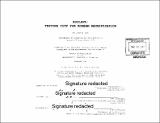Enclave : testing city for Korean reunification
Author(s)
Son, Joohui
DownloadFull printable version (47.62Mb)
Alternative title
Testing city for Korean reunification
Other Contributors
Massachusetts Institute of Technology. Department of Architecture.
Advisor
Miho Mazereeuw.
Terms of use
Metadata
Show full item recordAbstract
The city is a form which not only reflects, but also builds social relations. The forms of the city and the types of architecture in the city have been used as tools to lead and stimulate societies toward certain utopias. Then, how can the form of the city and architecture be a tool through which heterogeneous groups of people can live together despite serious political conflict? This thesis explores strategies to establish social relations between two heterogeneous societies, North Korea and South Korea, in Kaesong, a jointly run small industrial city. The two countries joined together to build an industrial city near their border to take advantage of the technology and capital of South Korea and of the labor force in North Korea. This thesis asks: What is the ideal city form for Kaesong City? What kind of scenario will stimulate the polarized people to mingle in Kaesong? What type of architecture will allow the two societies to live together happily? Although Korea was a single country for over 5,000 years before the Korean division in 1948, the North Korean and South Korean social structures are now totally different. Also, the shapes of the cities are entirely different, reflecting the social structures. However, current Kaesong is a replication of a South Korean typical industrial city. Despite the ruthless dictatorship of North Korea under the ideology of communism and socialism, the life of North Korean people is changing toward a free capitalist society. This thesis suggests Kaesong as the accelerator of that movement to reduce the economic and cultural gap between two countries. To do so, this thesis proposes a sequence of urban strategy and architectural types that transforms their everyday life toward a mixed type of city, instead of a replication of one country.
Description
Thesis: M. Arch., Massachusetts Institute of Technology, Department of Architecture, 2017. Cataloged from PDF version of thesis. Includes bibliographical references (pages 146-147).
Date issued
2017Department
Massachusetts Institute of Technology. Department of ArchitecturePublisher
Massachusetts Institute of Technology
Keywords
Architecture.